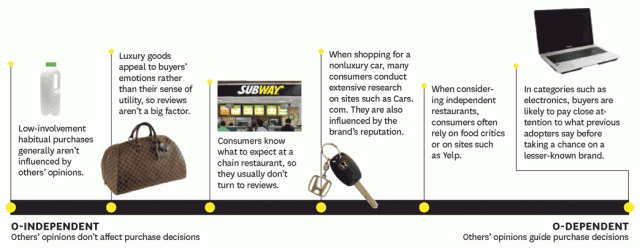Why consumers no longer care about brands – and what you can do about it
 As a follow up to what Leslie, the creative director of our Charlotte ad agency, posted this morning, here’s an approach we use to help our clients remain relevant in the lives (and minds) of today’s shoppers. The key to building and managing a successful retail brand is a function of how well you understand your influence mix.
As a follow up to what Leslie, the creative director of our Charlotte ad agency, posted this morning, here’s an approach we use to help our clients remain relevant in the lives (and minds) of today’s shoppers. The key to building and managing a successful retail brand is a function of how well you understand your influence mix.
In a recent Harvard Business Review article, Itamar Simonson and Emanuel Rosen provide a model for determining the impact effect of various variables on the final purchase decision.
In a nutshell: customers’ purchase decisions are typically affected by a combination of three things: prior preferences, beliefs, and experiences (P), information from marketers (M), and input from other people and from information services (O). This is the influence mix, and it’s best to think of it as a zero-sum game: the greater the reliance on one source, the lower the need for the others. If the impact of O on a purchase decision about a food processor goes up, the influence of M or P, or both, goes down.
In recent years O has taken on increasing weight in many categories, but plenty of exceptions remain. For example, habitual purchases (such as milk) tend to be dominated by P, while someone shopping for a toothbrush is most likely to be swayed by packaging, brand, pricing, and point-of-purchase messages – all components of M.
When our Charlotte marketing agency works with companies with shopper-facing brands, we try and understand to what extent do consumers depend on O when making decisions about their products? If you think the input a typical consumer gets from other people and from online reviews, as a continuum, then the closer a product is to the O-dependent end, the greater the shift in how consumers gather and evaluate information about it.
Once a company understands where its product falls on the O continuum, they can consider the strategic implications on their branding efforts. In domains where customers depend mainly on O, branding takes on less importance, and newcomers find relatively low barriers to entry as a result. (Research by Michael Luca, of Harvard Business School, suggests that in cities where large numbers of diners rely on Yelp reviews, independent restaurants tend to benefit, while chains and franchises often see their revenues decline).
Companies in O-dependent markets can also diversify more easily than others, because new peer-to-peer information can overcome long-held conceptions about what a company is (and isn’t) good at. LG and Samsung have taken full advantage of this capacity, moving beyond their original core products (electronics) into a broad array of tech goods and home appliances.
The big tactical takeaway
If online consumer reviews continue to gain ground as influential inputs, the need for and investment in brand loyalty programs should increase. In a world of perfect information, consumers don’t need brands as short-cuts anymore. They simply need to fire up the closest digital device, point it towards a review site or Internet search, and the brand (as perceived by fellow humans) will be displayed right there in front of their eyes.
For brands that have historically relied on the reputation or desirability of those brands as a new customer capture tool, the need to hold and expand their relationship with existing customers will become more important in relationship to other marketing efforts.
This will insulate the brand against missteps – loyal followers won’t abandon ship at the first sign of trouble. Instead, they’ll give the brand the benefit of the doubt and create a safe environment for the brand to explain itself. These same loyalists will likely need to be organized and directed to counter publish reviews and testimonials to offset any negative “press” a brand may receive. Lastly, if reviews successfully drive down the role of branding, then these reviews in essence become brand advertising. Thus, smart brands will invest in building a loyal army that will gladly sing the brand’s praises online and off.


